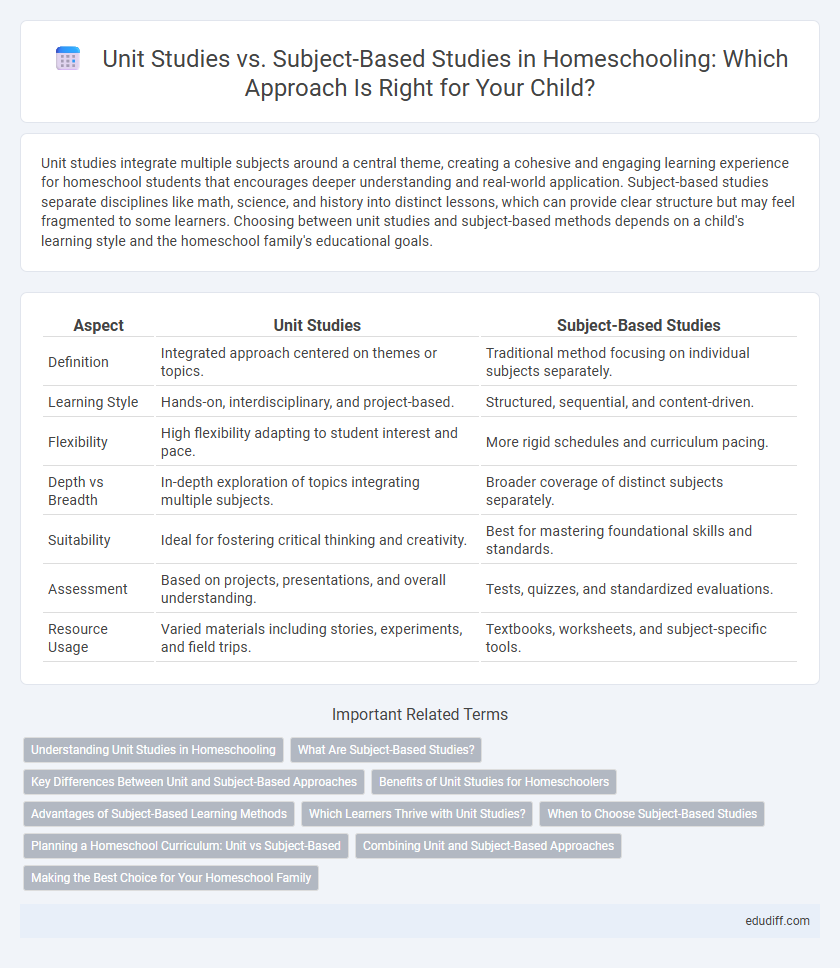Unit studies integrate multiple subjects around a central theme, creating a cohesive and engaging learning experience for homeschool students that encourages deeper understanding and real-world application. Subject-based studies separate disciplines like math, science, and history into distinct lessons, which can provide clear structure but may feel fragmented to some learners. Choosing between unit studies and subject-based methods depends on a child's learning style and the homeschool family's educational goals.
Table of Comparison
| Aspect | Unit Studies | Subject-Based Studies |
|---|---|---|
| Definition | Integrated approach centered on themes or topics. | Traditional method focusing on individual subjects separately. |
| Learning Style | Hands-on, interdisciplinary, and project-based. | Structured, sequential, and content-driven. |
| Flexibility | High flexibility adapting to student interest and pace. | More rigid schedules and curriculum pacing. |
| Depth vs Breadth | In-depth exploration of topics integrating multiple subjects. | Broader coverage of distinct subjects separately. |
| Suitability | Ideal for fostering critical thinking and creativity. | Best for mastering foundational skills and standards. |
| Assessment | Based on projects, presentations, and overall understanding. | Tests, quizzes, and standardized evaluations. |
| Resource Usage | Varied materials including stories, experiments, and field trips. | Textbooks, worksheets, and subject-specific tools. |
Understanding Unit Studies in Homeschooling
Unit studies in homeschooling integrate multiple subjects around a central theme, promoting deeper understanding and retention by connecting concepts in a cohesive context. This approach contrasts with subject-based studies that isolate disciplines, potentially limiting interdisciplinary connections and engagement. Homeschooling families often favor unit studies for their flexibility, creativity, and the ability to tailor learning experiences to children's interests and developmental stages.
What Are Subject-Based Studies?
Subject-based studies in homeschooling organize curriculum around individual academic disciplines such as math, science, history, and language arts, allowing for structured, focused learning in each subject area. This approach emphasizes mastery of specific content and skills within clearly defined subjects, often following a traditional school format with separate lessons and assessments. Subject-based studies are ideal for students who benefit from clear boundaries between topics and prefer sequential progression in their education.
Key Differences Between Unit and Subject-Based Approaches
Unit studies integrate multiple subjects around a central theme, promoting interdisciplinary learning and real-world connections, while subject-based studies separate disciplines for focused skill development in areas like math, science, or language arts. Unit studies foster student engagement through thematic exploration and hands-on activities, contrasting with the structured, sequential approach of subject-based curricula that emphasize mastery of individual subjects. Homeschoolers often choose unit studies for flexibility and holistic understanding, whereas subject-based studies suit those seeking systematic, in-depth expertise in each academic area.
Benefits of Unit Studies for Homeschoolers
Unit studies offer homeschoolers an integrated approach that enhances retention by connecting multiple subjects through a common theme, fostering deeper understanding and engagement. This method promotes critical thinking and creativity by encouraging hands-on activities and real-world applications rather than isolated memorization. Unit studies also provide flexibility for personalized learning paces and styles, making it easier to adapt curriculum to the child's interests and strengths.
Advantages of Subject-Based Learning Methods
Subject-based learning methods offer a structured approach to education, allowing students to deeply explore individual disciplines such as math, science, or history. This targeted focus enhances mastery through systematic progression and clear benchmarks, which facilitates standardized assessments and academic accountability. Emphasizing core content knowledge in each subject supports skill development that is essential for higher education and specialized career paths.
Which Learners Thrive with Unit Studies?
Unit studies benefit kinesthetic and relational learners who excel through hands-on activities and interdisciplinary connections, fostering deeper engagement with material across subjects. Students with a natural curiosity and preference for thematic learning thrive in unit studies as it integrates multiple subjects into cohesive, real-world contexts. This approach supports learners who struggle with traditional, segmented curricula by promoting critical thinking and retention through immersive, connected content.
When to Choose Subject-Based Studies
Subject-based studies are ideal for learners who thrive on structure and clear progression within each discipline, allowing focused mastery of subjects like math, science, and language arts. This approach suits students preparing for standardized tests or transitioning to traditional schools, where compartmentalized knowledge is emphasized. Choosing subject-based studies enhances depth in core academic areas and supports systematic skill development essential for higher education readiness.
Planning a Homeschool Curriculum: Unit vs Subject-Based
Unit studies integrate multiple subjects around a central theme, fostering interdisciplinary learning and real-world application, while subject-based studies emphasize mastery in individual disciplines with focused lessons and assessments. Planning a homeschool curriculum involves balancing the flexibility and creativity of unit studies with the structure and depth provided by subject-based approaches to meet a child's unique learning style and goals. Effective homeschool planning requires aligning educational objectives, curricular resources, and assessment methods to optimize student engagement and academic progress.
Combining Unit and Subject-Based Approaches
Combining unit studies and subject-based approaches in homeschooling creates a dynamic learning environment that enhances concept retention and engagement. Unit studies integrate multiple subjects around a central theme, fostering interdisciplinary connections, while subject-based studies provide structured depth in core areas like math, science, and language arts. This hybrid model supports holistic education by blending thematic exploration with targeted skill-building, appealing to diverse learning styles and reinforcing knowledge through varied contexts.
Making the Best Choice for Your Homeschool Family
Unit Studies integrate multiple subjects into a cohesive learning experience, fostering deeper comprehension and real-world connections, while Subject-Based Studies emphasize focused mastery of individual disciplines with structured curricula. Choosing the best approach depends on your homeschool family's learning style, goals, and flexibility preferences, as Unit Studies often suit hands-on, interdisciplinary learners and Subject-Based methods benefit those seeking systematic progression. Understanding your child's needs and your educational priorities ensures an effective, customized homeschool plan that maximizes engagement and academic success.
Unit Studies vs Subject-Based Studies Infographic

 edudiff.com
edudiff.com